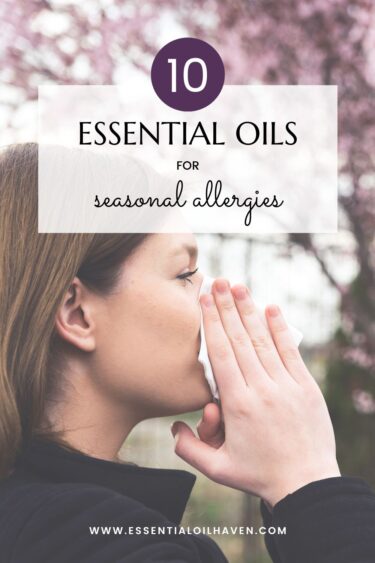 In this article, you’ll find the best essential oils for allergies. Plus: ways that you can use them as a natural home remedy.
In this article, you’ll find the best essential oils for allergies. Plus: ways that you can use them as a natural home remedy.
Allergy symptoms range from runny noses and watery eyes to swelling, itching, asthma, sneezing, or fever.
If you’re looking for a natural home remedy for allergies, aromatherapy can help! A variety of essential oils are available to help ease allergy symptoms throughout the year.
This post contains affiliate links, which means if you make a purchase through these links, I may receive a small commission at no extra cost to you. Read my full disclosure policy here.
Allergies can’t be completely cured. But don’t ignore the symptoms! Natural home remedies can help you find relief. These treatments can help build up resistance to certain allergens or environmental factors.
NOTE: If your symptoms are severe, seek the help of a medical professional immediately.
Why Do Allergies Happen?
An allergy is the body overreacting to something in the environment that causes no problem to most others. Research shows that a sensitized immune system causes allergies.
Common triggers to seasonal allergies include tree, grass and weed pollen. Many suffer from symptoms particularly in the spring and summer months.
Seasonal allergies that begin in spring can set on as early as February, and end in early summer. Depending on a variety of environmental factors, symptoms could last throughout the summer months into fall.
Allergies can begin at any time throughout your life, and both men and women suffer equally.
Top 10 Best Essential Oils for Allergies
Essential oils help reduce allergy symptoms and offer natural allergy relief.
Aromatherapy can boost the human immune system to better withstand the allergic reactions. It’s about treating symptoms more than treating the cause.
Use caution when using aromatherapy for the first time. If you plan to apply the oils topically, do a skin patch test just to be sure. And always properly dilute the oils for your age, skin type, and duration of use.
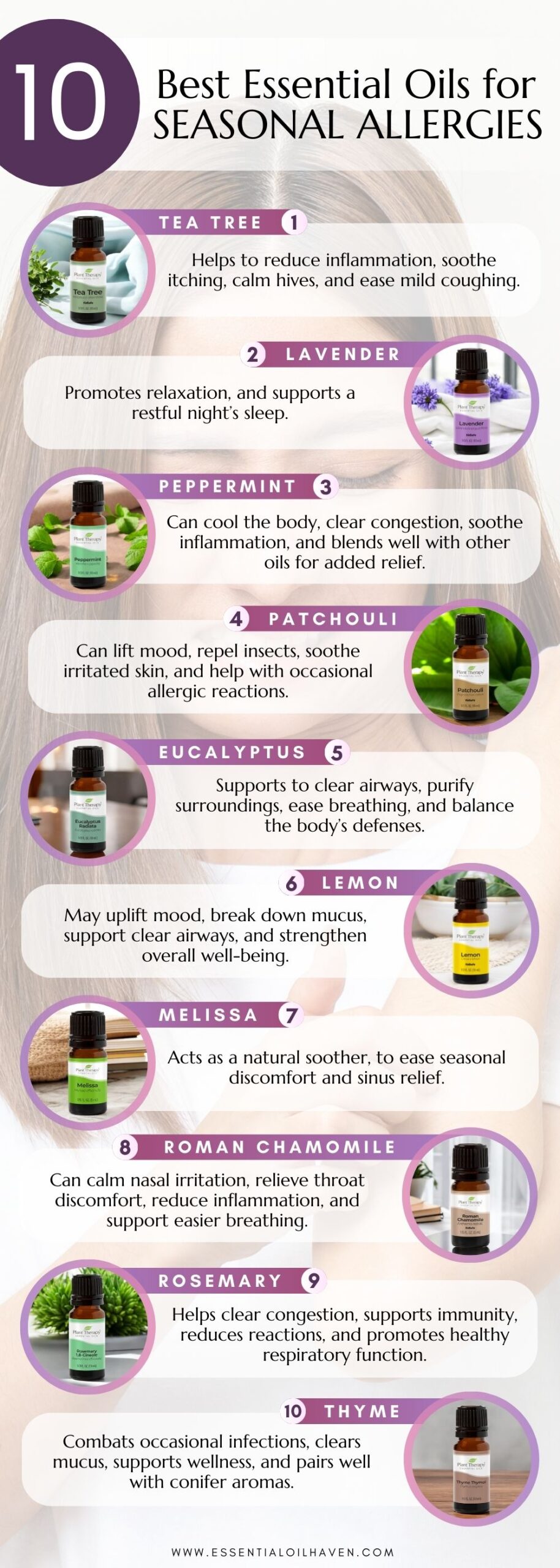
1. Tea Tree
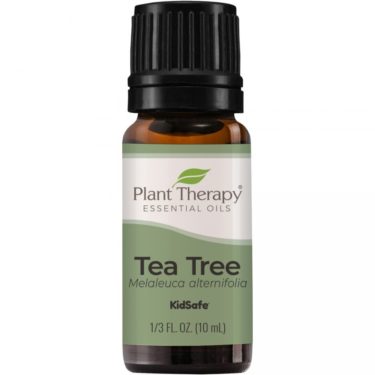
Tea Tree from Plant Therapy
Ca $8 Here
Tea tree oil, also known as melaleuca oil, is a powerful essential oil for allergies. It helps to reduce inflammation and aids in alleviating associated symptoms. Diffusing it into the air or adding a couple of drops to a carrier oil and rubbing it behind your neck and on your wrists can be beneficial.
As you breathe in the powerful scents of the oil, your body will respond with a reduction in swelling from itching eyes, and runny noses, and may aid in reducing cough. Melaleuca can be used topically on hives and rashes, but never undiluted.
2. Lavender
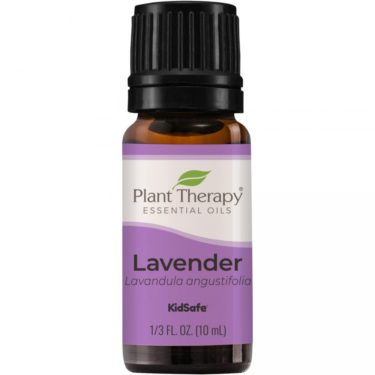
Lavender Essential Oil from Plant Therapy
Check Price
Lavender is the most versatile of all essential oils. It is a fantastic oil to reduce a variety of symptoms caused by allergies.
Since it is gentle, you can apply it with or without a carrier oil. Carry the oil with you and add a drop or two to your wrists or the back of your neck whenever you feel symptoms coming on.
Lavender is fantastic topically and perfect for diffusing to reduce coughing. It helps relax the body and supports restful sleep.
Make Lavender essential oil part of your natural home remedies tool kit, and apply it for your or your allergies.
3. Peppermint
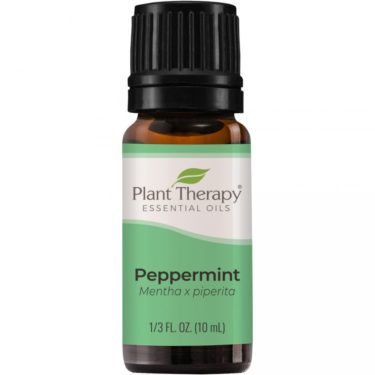
Peppermint Essential Oil
Check Price
Peppermint essential oil is strong and soothing. A little goes a long way with this one. Peppermint oil is a great choice for allergies because it helps reduce inflammation. Plus, it has cooling effects on your system. Diffusing it or putting a drop on the back of your neck can reduce allergy symptoms.
For a soothing allergy relief blend, combine equal amounts of peppermint, lemon and lavender essential oil. It is important to understand how much to mix of each oil in a combination. You can head over here more information on blending essential oils.
4. Patchouli
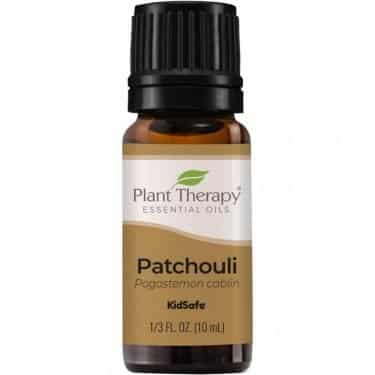
Patchouli Essential Oil
Get It Here
Patchouli is also quite a versatile essential oil. It is beneficial for those suffering with allergies. And if that’s not timely enough, it works on mosquitoes too. Further, Patchouli can lift moods. Reach for your Patchouli oil when you’re feeling down in the dumps about your allergy symptoms.
Patchouli is an anti inflammatory, antidepressant, and sedative essential oil. Since it is a great tonic for skin and hair, it helps to aid inflamed skin from hives, runny noses and sneezing. It is a great choice to take with you when camping, or traveling, since it can work as a bug repellent as well.
5. Eucalyptus
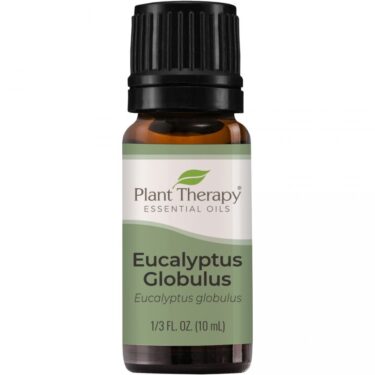
This Eucalyptus Oil is under $10 for the bottle.
Shop Here
Eucalyptus essential oil may help you feel relief from seasonal allergies. It is an anti inflammatory and decongestant oil with a reputation to purify, cleanse, and clarify. Eucalyptus is a great oil to balance the immune system, which can help prevent allergies in the first place.
It facilitates easy breathing and may bring a good amount of relief from cough or chest congestion.
6. Lemon
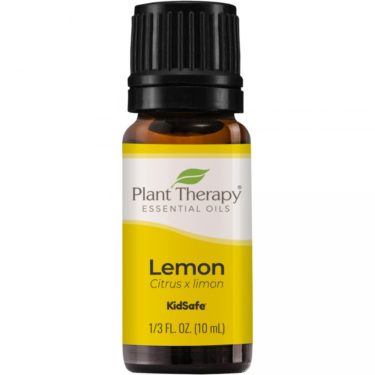
Lemon essential oil
Get it Here
Lemon essential oil can help break up mucus and relieve congestion. It’s perfect for those days when your stuffy nose gets the best of you! As an uplifting citrus oil, it inspires you to be happy and lively. Lemon oil ideal for respiratory support. It also makes an excellent “travel buddy” to keep on hand when you want to keep your immunity strong.
During the growing of citrus fruit, the citrus trees can be heavily sprayed with herbicides and pesticides. I recommend buying the organic variety of lemon essential oil. Here’s why organic farming practices matter in the quality of essential oil that is produced.
7. Melissa
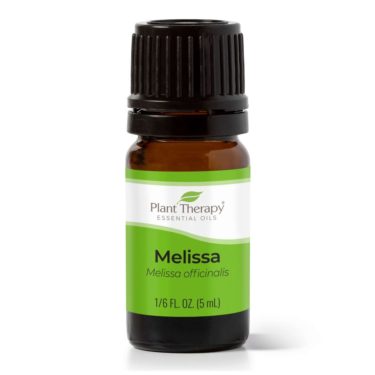
Melissa Essential Oil
Shop Here
Melissa essential oil, also known as Lemon Balm, is a cousin to lemon essential oil. But you have to use it with a lot more caution! Not only is it more rare and costly than lemon, it’s also significantly more potent. Don’t dilute to more than 1%.
Melissa offers a great antihistamine effect, which is rare to find in essential oils. This is useful for treating various allergies, hay fever, or other irritations of the upper respiratory tract. Melissa oil can combat inflammation in lungs and sinuses.
8. Roman Chamomile
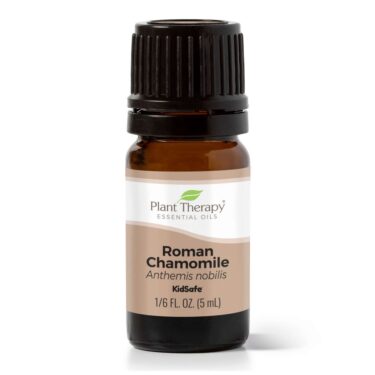
Roman Chamomile (Kid Safe) Essential Oil, 5 ml
Get it here
Roman Chamomile is the milder, gentler version of German Chamomile essential oil. Many favor it in steam baths for hay fever, sore throat, or sinus inflammation. Inhaling aromatherapy steam can help clear nasal passages and relieve congestion in the respiratory tract.
It also acts as a mild pain reliever, helping to ease mild discomforts such as arthritis or joint pain.
9. Rosemary
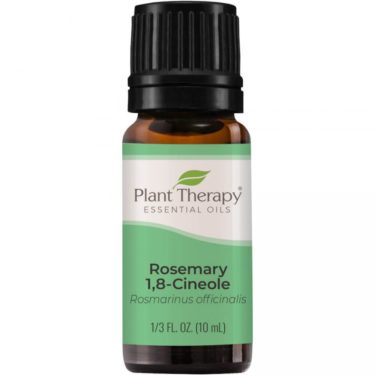
Rosemary Essential Oil from Plant Therapy
Check Price
Rosemary can decrease your body’s response to allergens. The Rosemary ct. camphor chemotype specifically is known for its beneficial effects on respiratory support. It has anti inflammatory properties that can help the body clear away mucus and open up the airways. It’s infection-reducing talents support your body’s overall health and immunity.
10. Thyme
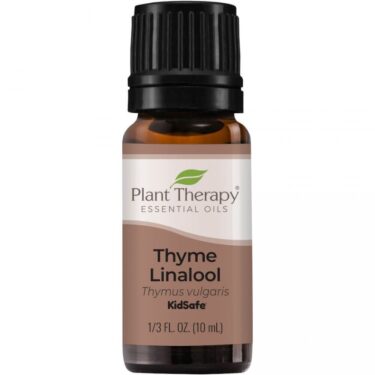
Thyme Essential Oil, 10ml
Get it here
Thyme has powerful effects against infections and inflammation, which is what’s needed when you’re suffering from allergies. Its fresh and herbal scent can make it easier to breathe when congested.
Combine it with other conifer oils such as Juniper, Hemlock or Black Spruce for a balanced effect.
Allergy Relief Kit

Sneezing is a very common symptom of seasonal allergies.
To get started with, it’s sometimes handy to be able to buy a simple kit. This handy “Breathe Easy” starter kit from Plant Therapy would be a great addition to your shopping cart.
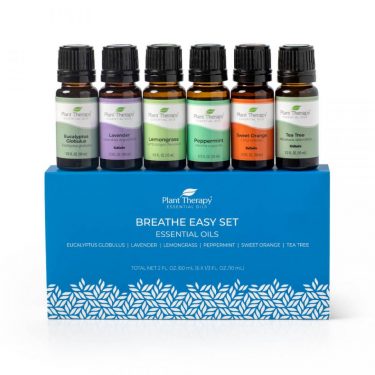
Plant Therapy’s Breathe Easy Set
Get It Here
This set includes 4 of the 10 recommended oils above: Tea Tree, Lavender, Peppermint, and Eucalyptus. You’ll already have them all included in this handy kit!
If you’re not sure about the Plant Therapy brand of essential oils, read my in-depth company review here. They’re a superb, reputable essential oils company.
How to Use Essential Oils for Allergies
There are a variety of ways to use essential oil to treat your allergies. Here are the most common and easy ones:
1. Diffuse
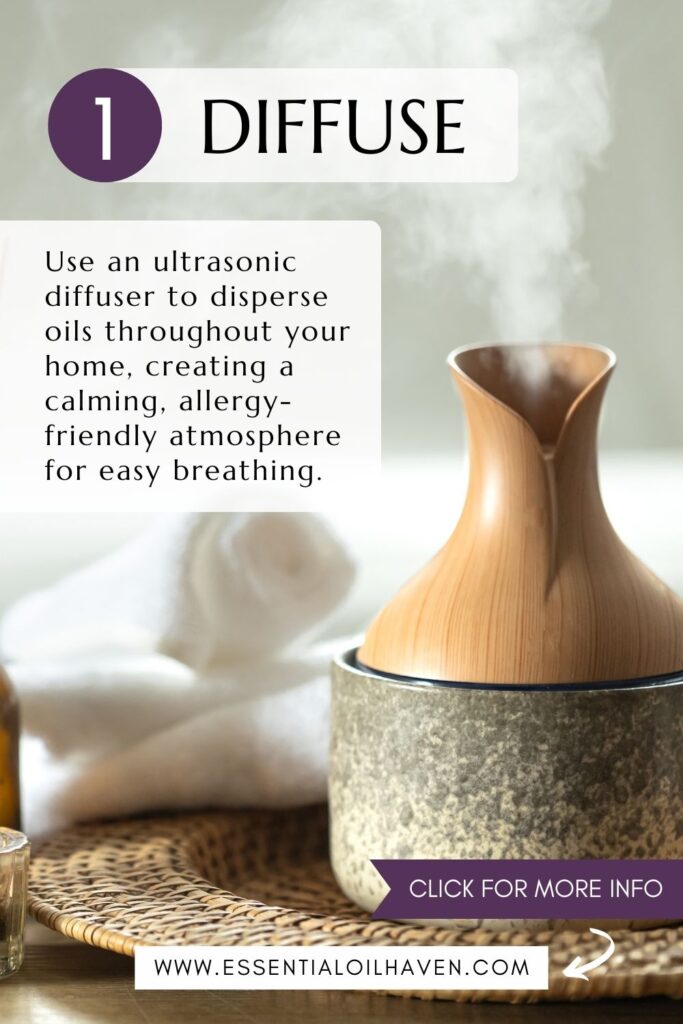
Use an ultrasonic essential oil diffuser to diffuse essential oils around your home.
2. Apply on Pulse Points

Wear any of the listed oils on your skin after diluting with a carrier oil. Apply to the pulse points such as wrists, ankles, or behind ears. Blend your favorite allergy-relieving essential oils into a roller bottle. Carry the blend with you when you leave your home. Small bottles with roller tops are available for sale at a variety of online shops. Check Amazon for what you need, and you’ll be ready to blend in no time! Here’s the tutorial on how to make a roll-on bottle at home.
3. Hot Steam Inhalation
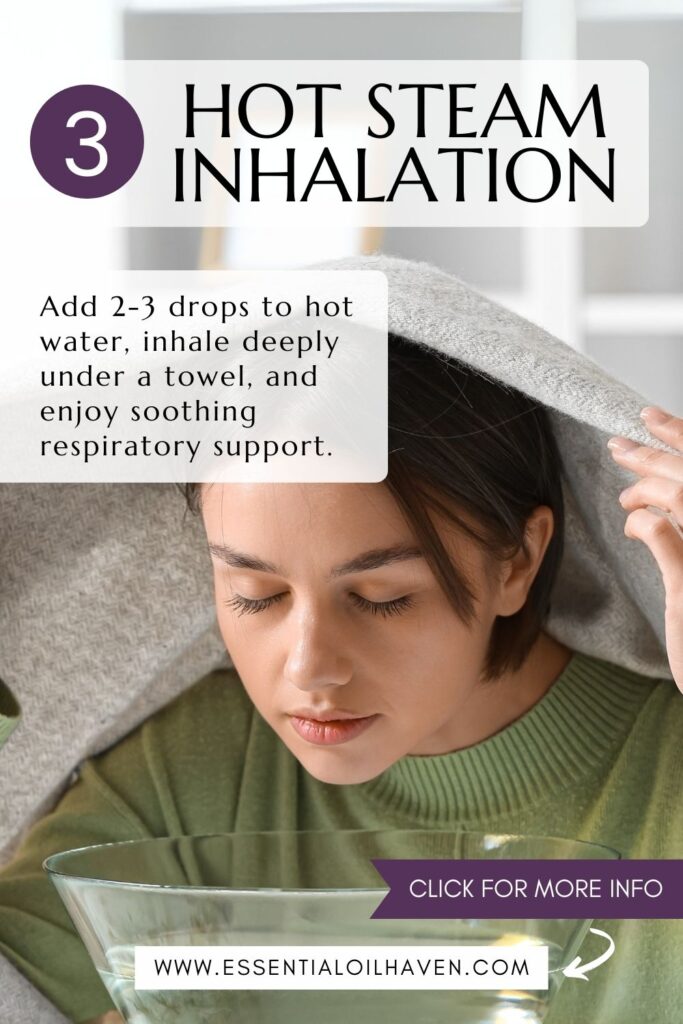
Fill a medium-sized bowl with steaming hot water and add 2-3 drops of essential oils. Hold your face and nose over the steaming bowl and cover yourself with a towel. Do a rotation of 15 seconds inhaling the steam, then remove your face for the next 15 seconds to take a break. Repeat as many times as feels good.
4.Bath

Add essential oils to your bath as a nice way to reduce symptoms and elevate your mood. Follow this DIY bath salts recipe and add the recommended amount of oil drops.
Do Oil Diffusers help with Allergies?
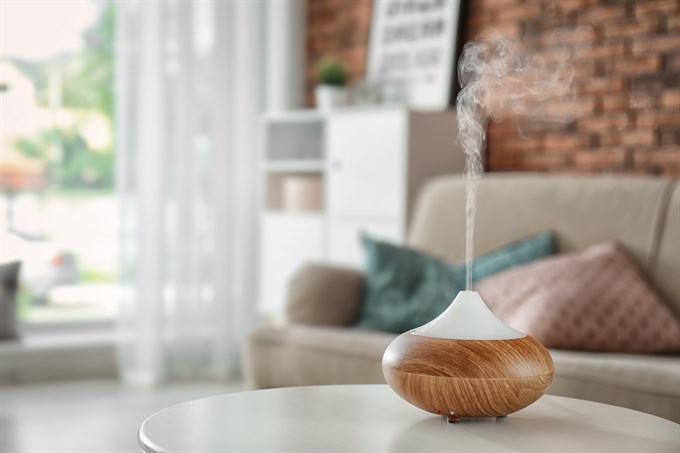
Diffusing essential oil can help relieve seasonal allergy symptoms.
Diffusing oils in your home can make a difference on the quality of your life during allergy season.
Most popular oil diffusers use ultrasonic cold-mist technology. This means that the oils will not be heated, keeping their therapeutic properties intact. Heat can alter an essential oil.
Choose from the best essential oils mentioned above. Use what you already have at home, or order an oil bottle or two online. Follow your diffuser instructions on how many drops in total to use. Typically, it’s around 5-6 drops for an average-sized diffuser unit.
Add the oils to your diffuser and run it for 30-60 minutes at a time. Do give your house and room a break every once in a while, as to not overwhelm yourself with the essential oil scent.
Having the essential oil particles circulate the air in your room can help relieve allergy symptoms. It also provides a calming environment for other respiratory conditions.
Balancing Your Immune System with Essential Oils

Keep Your Immune System Running Well & You’ll Have Less Problems with Seasonal Allergies.
Allergies are a result of an over-active immune system. A generally harmless substance causes some people’s immune systems to react. It then creates a defense mechanism to try and get rid of the perceived threat. This shows in signs such as a runny nose, itching skin, itchy or watery eyes, coughing, or wheezing.
A weak or impaired immune system can expose the body to increased susceptibility to infections and disease. Many things can weaken your immunity. For example: external toxins, viruses and physical or emotional stress.
Thus, it is worth looking into what types of oils can bring balance and prevent symptoms in the first place. Our immune system is an important part of what keeps us healthy. A balanced immune system is what we want.
Since it’s a balance we want, we’re not only looking to aromatherapy to treat allergy symptoms, but to prevent allergies from starting in the first place. Use these essential oils to balance the immune system. And, try to reduce stress and external toxins.
Final Thoughts
Don’t let seasonal allergies get you down. There are a lot of essential oils for allergies to choose from! Blend your favorite oils and experiment with different scents to boost your individual immune system.
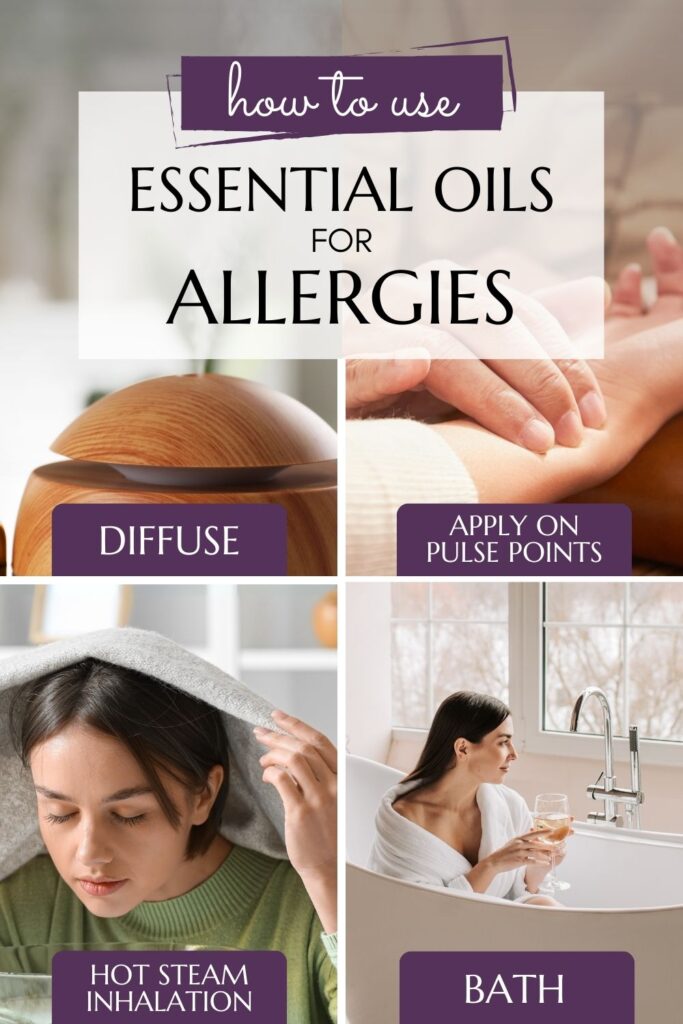













Leave a Reply